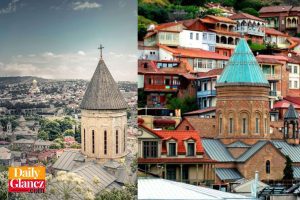Ghana Tourist Exploration

Ghana Tourist Exploration
Introduction
Ghana, a culturally rich nation, offers much to tourists. Ghana is among the friendliest countries in West Africa due to its friendly people, fascinating history, eye-catching clothing, and delicious food, which draw visitors back. Ghanaian life is usually slow and laid back, but sometimes it gets chaotic. Accept the city’s cultural differences, traffic, and competitive shopping, and you may fall in love. Here’s what you need to know before visiting Ghana for the first time or returning. Ghana’s regions offer a different adventure around every corner, from stunning coastal views to majestic mountain views, from historic hilltop towns to bustling urban centres.
Which Season Is Best For Ghana Travel?

What activities and weather you like will determine the best time to visit Ghana. Ghana is best visited in the dry season from November to March. Due to dryer and colder weather, this time of year is ideal for hiking, wildlife observation, and cultural encounters. Enjoy coastal and national park visits, too. If you do not mind rain, go for lush scenery in April or May, the start of the rainy season.
This is Ghana’s greenest season, with lush vegetation and beautiful waterfalls. Prepare for rain. Avoid the rainy season’s peak, from July to October, as intense rain can ruin travel and other plans. High humidity and tropical diseases like malaria increased during this time. Most people visit Ghana during the dry season, November–March, but your interests and weather tolerance determine the best time.
Prepare Admission Paperwork
Obtaining Ghana travel documents is expensive. Ghana requires all visitors to have a visa, which costs different for single- and multiple-entry visas. Ghana visas can take almost three weeks to arrive without expedited services. You need a yellow fever vaccine to enter Ghana. Visit the health department or local clinics for vaccinations. Guests should also take malaria medications prescribed by their doctor. Ghanaian pharmacies have an ample supply at lower prices if you cannot get them before your trip.
Important Ghana Travel Information
-
Cedi (GH₵) is the currency. The approximate value of one dollar is GH₵ 14.43.
-
Set a daily budget of GH₵ 288 ($19.97) for one person.
-
English is the most common language. There are over fifty native languages, with Akan being the most spoken.
-
Type of socket: Ghana uses 50Hz, 230V, and D and G plugs.
-
Greenwich GMT is the time zone.
-
The top three travel destinations are Kumasi, Cape Coast, and Accra.
-
The top monuments are the Larabanga Mosque, Mole National Park, and Cape Coast Castle.
Ghanaian Visa Info
Use our visa checker to see if you need a Ghana visa, then apply at the nearest embassy or consulate. The Ghanaian government plans to issue online Ghana eVisas soon. Once available on iVisa, this electronic travel document temporarily allows qualified foreign nationals to enter Ghana for business and tourism.
Cultural And Historical Sites
Ghana’s cultural and historical sites reflect its rich past. These sites reveal national history. Must-see Ghanaian historical and cultural sites include:
-
Cape Coast and Elmina Castles: European powers built these two castles as slave trading posts during colonial times. These historical sites reveal Ghana’s troubled past.
-
Independence Square: This famous square commemorated Ghana’s 1957 independence from Britain. The central Accra location attracts tourists who want to take photos and learn about Ghana’s history.
-
Ghana National Museum: This museum showcases Ghana’s rich cultural heritage with a large collection. Traditional clothing and antique pottery teach visitors about Ghana’s past and present.
-
Nkrumah Memorial Park: Kwame Nkrumah, Ghana’s first president, led the country to independence. The park has a mausoleum and museum honouring Nkrumah.
Natural Attractions
-
Ghana boasts a wide variety of wildlife, gorgeous waterfalls, and lush forests. See the natural wonders of the country by visiting the following attractions:
-
Kakum National Park: Birds, primates, and the rare forest elephant live here. Hiking, canopy walking, and guided park tours are available to visitors.
-
Mole National Park: This park offers excellent views of Ghanaian wildlife, including antelopes, elephants, and baboons. Visitors can access a guided tour, a safari, or a stroll through the park.
-
WLI Falls: Located in Ghana’s Volta Region, this waterfall is the tallest in West Africa. In addition to taking guided tours and swimming in the pool, visitors can hike to the waterfall.
-
Bosumtwi Lake: This lake in Ghana’s Ashanti Region may have formed due to a meteorite impact. Fishing, boating, and guided tours are available to visitors to the lake.
Beaches
Ghana’s 500-kilometre coastline has clean, recreational beaches. Popular beaches in Ghana include:
-
Labadi Beach: This Accra beach is popular in Ghana. Swimming, tanning, jet skiing, and surfing are all available to visitors.
-
Kokrobite Beach: This beach in Ghana’s West Region is calm. Visitors can surf, relax on the beach, or enjoy live music and local cuisine at one of the many beachside bars.
-
Ada Foah Beach: The Eastern Region of Ghana has this remote beach. Take a Volta River boat ride, explore the nearby mangrove forests, or relax.
Food And Drink
Ghanaian cuisine celebrates the country’s rich cultural heritage with a delicious mix of regional and global flavours. Popular Ghanaian cuisines include:
-
Jolli-flavored rice: This one-pot meal combines tomatoes, onions, and spices. It is a staple of Ghanaian cuisine, served at weddings.
-
Banku and Tilapia: Ghanaians eat banku made from corn and cassava dough. A spicy pepper sauce and grilled tilapia are typical.
Conclusion
Ghana’s natural beauty and cultural diversity make it a great travel destination. In the dry season, November through March are best for seeing its varied landscapes and historical sites. Get your visa and immunisations, learn local customs and currency, and plan your trip. Must-sees include Kakum and Mole National Parks, Cape Coast and Elmina Castles, and Labadi and Kokrobite beaches. Banku with tilapia and jollof rice is tasty Ghanaian food. Visit Ghana’s nature for an unforgettable experience.











